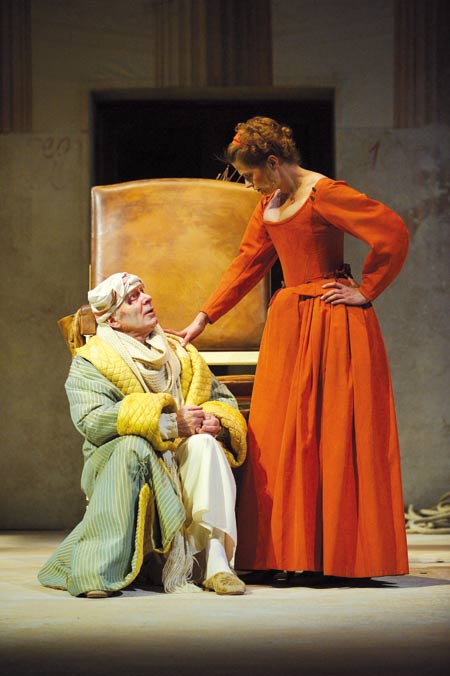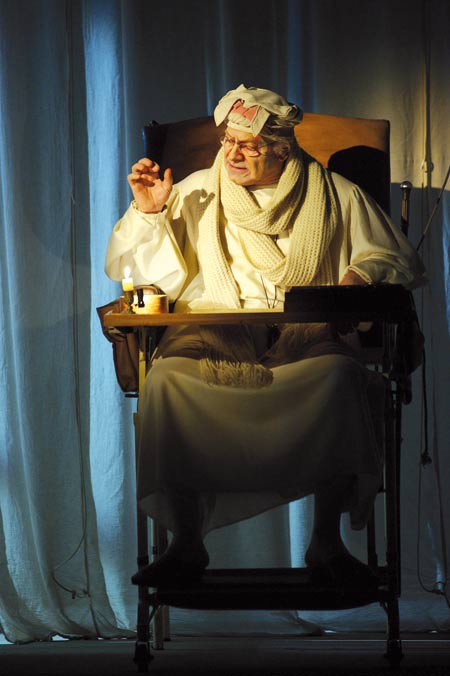The Universal Molière
Scene from Claude Stratz's production of Moliére
Comédie-Française, a respected theater company over 300 years old, owes much of its reputation to Molière, sometimes known as the founder of French comedy.
Established in 1680 at the royal instruction of King Louis XIV, who wished Molière's company to join forces with Paris's other theater companies, Comédie-Française now has a repertoire of over 3,000 plays, performing a rich oeuvre of classic, modern and contemporary works.
In preserving the traditions of their three most performed dramatists – long-deceased French masters Molière, Jean Racine and Pierre Corneille – the theater has successfully stayed true to its roots and their classic texts without turning them into lifeless museum pieces.
Currently on an Asian tour, Comédie-Française is presenting the legendary playwright's last work, comedy-ballet The Imaginary Invalid, at the National Centre for the Performing Arts (NCPA) next week.
Molière himself originally played the title role of the miserly hypochondriac on its debut in 1673, ironically, collapsing, and later dying, of his own fatal illness – pulmonary tuberculosis – while on stage.
First directed by late Swiss director Claude Stratz at its debut in 2001, Comédie-Française's satirical production tends to underscore the darker aspects of the play.

Scene from Claude Stratz's production of Moliére
As the theater's General Administrator Muriel Mayette (who plays the wily maid Toinette) puts it,"The satire and mockery of the universal title character can help us get to know our own weaknesses and disclose our scars through laughter."
The Imaginary Invalid follows the story of a controlling father, Argan, on his"deathbed."
Convinced he is afflicted with various illnesses, Argan tries to wed his daughter, Angelique, to a doctor's son, thus saving on medical bills. Angelique, having found Mr Right herself, is unwilling to marry for money.
Self-absorbed Argan remains ignorant, meanwhile, of his greedy second wife's scheme to inherit his fortune after his death, leaving it to Toinette, the shrewd maid, to hatch a plot to fix things.
Since its debut, the comedy has been enjoyed more than 2,250 performances, with January 15 now dedicated to the great master playwright in his home country.

Scene from Claude Stratz's production of Moliére
"The greatest value of Molière's works is his concern for human beings and the humanitarian complex," said Mayette.
"His greatest talent is that he knows human beings and...how to depict our weakness and drawbacks...Many of his characters are typical and universal, easily seen in life. Except for Don Juan, all his works are reflecting on and analyzing human beings. He helps us to know ourselves better."
Stratz's version utilizes bare-bones staging, restoring both comic and tragic effects, and has toured many countries in the past decade. Argan spends much of the play trapped in an armchair – a symbol of his loneliness – and also recalling the chair on which the playwright died, which later became the theatrical company's keepsake.
"It is a classical production. In an aesthetic sense, it helps present the purity of the play to the largest extent without any attached visual effects," commented Mayette.
"We do not change a single line from the original play. Sometimes the audience thinks that we have made changes to the text, but we don't, it is just because the actors are so good at their acting."
A successful actress herself, Mayette plays a good-hearted maid who is often rude and scornful of her boss.
"[It is ] because she loves him," she explained."It is like when we love someone, we will rush to him or her to tell them not to lose [their] spirits and not to be bothered by dark emotions and fears," said Mayette, expounding on her role.
"Her 'hatred' comes from love and the character helps me understand that. Although Molière spent his life revealing human beings' ugliness and weakness, he actually loves them."
The weakness in Argan can be seen in every corner of the world and everyone can find some similarities with him, she noted.
"We can develop an ability to mock and analyze ourselves, as well as the ability to share happiness and curiosity towards the world."